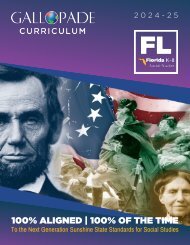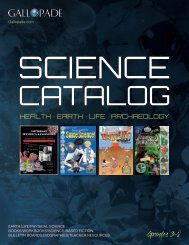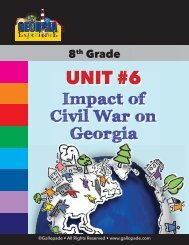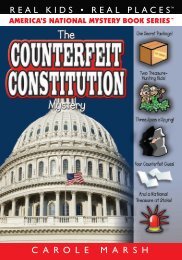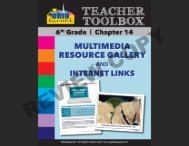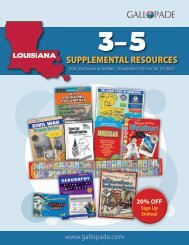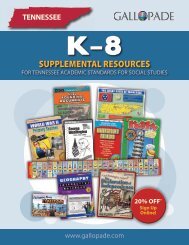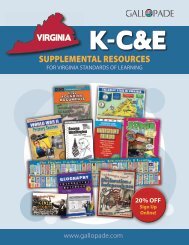Virginia Experience Civics & Economics Social Studies
The Virginia Experience effectively teaches students about United States history. All curriculum materials cover foundations of the U.S. government, citizenship, political process, understanding government, judicial system, public policy, economy, and finances as required by the Virginia Standards of Learning (SOL).
The Virginia Experience effectively teaches students about United States history. All curriculum materials cover foundations of the U.S. government, citizenship, political process, understanding government, judicial system, public policy, economy, and finances as required by the Virginia Standards of Learning (SOL).
You also want an ePaper? Increase the reach of your titles
YUMPU automatically turns print PDFs into web optimized ePapers that Google loves.
Table of Contents<br />
CHAPTER 1: Foundations of the U.S. Government 7<br />
Lesson 1: Fundamental Political Principles ........................................................................................<br />
7<br />
Lesson 2: Founding Documents .......................................................................................................... 9<br />
Lesson 3: Preamble of the U.S. Constitution ....................................................................................<br />
14<br />
Lesson 4: Amending Our Constitutions ............................................................................................ 16<br />
CHAPTER 2: Citizenship 18<br />
Lesson 5: How to Become a Citizen ................................................................................................... 18<br />
Lesson 6: Key Citizenship Freedoms ................................................................................................. 22<br />
Lesson 7: Personal Character Traits of Good Citizens ...................................................................... 24<br />
Lesson 8: Duties of a Citizen ..............................................................................................................<br />
29<br />
Lesson 9: Your Civic Responsibilities................................................................................................. 32<br />
Lesson 10: Serving the Public Good .................................................................................................. 34<br />
Lesson 11: Functions of Political Parties........................................................................................... 38<br />
Lesson 12: Comparing Political Parties...........................................................................................<br />
............................................................................................. 40<br />
Lesson 13: Evaluating Campaigns (the Role of Media)....................................................................<br />
43<br />
Lesson 14: Campaign Contributions and Costs................................................................................<br />
48<br />
Lesson 15: Registering and Involving Voters ................................................................................... 50<br />
Lesson 16: The Role of the Electoral College .................................................................................... 55<br />
Lesson 17: Structure and Powers ...................................................................................................... 57<br />
Lesson 18: Separation of Powers.......................................................................................................<br />
60<br />
Lesson 19: How U.S. Laws Are Made .................................................................................................<br />
64<br />
Lesson 20: The Executive Branch.......................................................................................................<br />
68<br />
Lesson 21: Structure and Powers ...................................................................................................... 71<br />
Lesson 22: Working with the National Government........................................................................ 74<br />
Lesson 23: How State Laws Are Made ............................................................................................... 77<br />
Lesson 24: The Executive Branch and Regulatory Boards............................................................... 81<br />
Lesson 25: Structure Sample.....................<br />
and Powers ...................................................................................................... 84<br />
Lesson 26: Working with State Government .................................................................................... 87<br />
Lesson 27: How Local Laws are Made ............................................................................................... 88<br />
CHAPTER 3: The Political Process 38<br />
CHAPTER 4: Understanding Our National Government<br />
57<br />
CHAPTER 5: Understanding State Government<br />
71<br />
Sample<br />
CHAPTER 6: Understanding Local Government<br />
84<br />
CHAPTER 7: Our Judicial System 91<br />
Lesson 28: Federal and State Courts ................................................................................................. 91<br />
Lesson 29: How Judicial Review Works ............................................................................................. 95<br />
Lesson 30: Civil vs. Criminal Cases .................................................................................................... 97<br />
Lesson 31: What Due Process Means .............................................................................................. 100<br />
©Carole Marsh/Gallopade • www.gallopade.com • <strong>Virginia</strong> <strong>Civics</strong> & <strong>Economics</strong> • Page 5<br />
~ This book is not reproducible. ~




